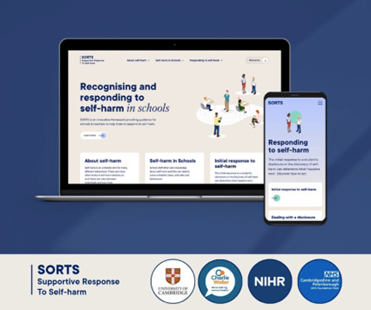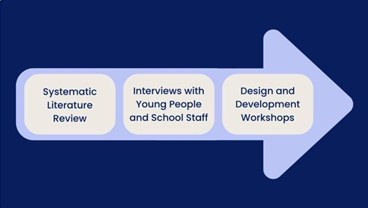Self-harm among adolescents is increasing in prevalence (Hulbert et al, 2023), and there is a lack of evidence-based, whole-school approaches to support students and staff with their response to self-harm (Pierret et al, 2022). Whole school interventions include a coordinated set of activities that align with the teaching curriculum, school ethos, environment, and family and community partnerships (Goldberg et al., 2019). This blog discusses the need for a whole-school approach to self-harm training in schools alongside the SORTS study, which used co-production methods to develop the Supportive Response to Self-Harm in Schools (SORTS) toolkit.

What is the Need for Self-harm Training in Schools?
Imagine that you are a teaching assistant and work closely with a pupil daily. The student respects and trusts you, and one day chooses to tell you that they have hurt themselves intentionally. You have received safeguarding training and know that you need to pass this information on, but you have never spoken to a student about self-harm before or had any self-harm awareness training. You may be worried about what to say and may have lots of questions – Why have they done this? Are they at risk of suicide? What should I say?
School staff are important adults in young people’s lives and are often the first professionals to recognise self-harm behaviours in their students (Berger et al., 2013). There are clear safeguarding procedures in place for staff to raise concerns about a student’s social, emotional or physical wellbeing. However, research shows that many school staff lack confidence in discussing self-harm, leading to reactions of shock, panic and anxiety during disclosures, all of which can impact a young person’s trust, willingness to share, and their beliefs about whether they can be helped (Best, 2006; Downing & Doyle, 2016). These reactions are often due to school staff lacking understanding about self-harm, why it happens and how to best respond (Evans et al., 2019; Colville et al., 2024, Berger et al, 2014). Training all school staff and delivering whole-school approaches to mental health has been demonstrated to produce small but significant improvements in students’ social and emotional adjustment, behavioural adjustment and internalising symptoms (Goldberg et al., 2019).
Training all school staff is important because support staff work alongside teaching staff to build trust and rapport with students (Littlecott et al., 2018). Students may therefore choose to confide in any member of staff they trust, not only teaching staff.
Whole-school training can also help to promote a shared understanding of the intervention and communicate school values, both of which are important for school culture and effective implementation (Moore et al., 2024). Pierret et al., (2022) found that training programmes can increase staff knowledge and confidence in responding to self-harm, despite the lack of evaluated self-harm training programmes and support tools for school staff. The review recommended that schools adopt a whole-school approach to self-harm and emphasised the importance of training all staff on how to respond supportively to self-harm to help reduce stigma.
SORTS – The evidence-based training programme and resource toolkit
In response to this unmet training need, we developed SORTS (Supportive Response to Self-harm in Schools) for school staff to improve their knowledge of self-harm and confidence in responding to students who self-harm (Burn et al., 2024a). It consists of three parts: a 30-minute e-learning module, a website with information and videos, and downloadable resources for schools to use.
The SORTS study developed the training content based on existing research evidence and in collaboration with experts from the Charlie Waller Trust and school mental health professionals (e.g. mental health leads, counsellors, therapists). The project used a person-based approach which involved consulting with end-users (e.g. school staff) to add their viewpoint at every stage of the development process (Yardley et al., 2015). The SORTS team conducted focus groups and interviews with teaching and non-teaching school staff, as well as young people, to co-produce the toolkit.

The co-production of the website and resources was essential to ensuring their acceptability and feasibility within school settings. Coproduction workshops with school staff focused on the comprehensiveness of the training content, design and user engagement. Alongside the website, a suite of resources were co-produced with schools, young people and school mental health teams (Burn et al., 2024a). The information and support resources encourage a whole-school approach by educating students and parents on self-harm. Resources for school staff explain self-harm behaviour, risk factors and how to respond, as well as specialised resources for mental health teams. All these resources are free, and downloadable straight from the website.
Based on user feedback, we developed an entry-level e-learning module for all staff (Burn et al., 2024b). To foster a whole-school approach to self-harm, the training is aimed at all members of staff, including those from senior leadership teams (SLT), teachers to administrative and catering staff. During co-production, school staff felt it was important for the e-learning module to promote staff well-being alongside pupil wellbeing. In response to this, we ensured the module was of minimal time burden, contained only essential detail on self-harm, signposted to additional support and emphasised the wider professional network that supports the pupil. The final co-produced e-learning module takes around 30 minutes to complete to increase the feasibility and sustainability of the intervention within a school setting (Han et al., 2005). All information is evidence-based and the module links to research journals when appropriate. It includes two co-produced video scenarios of student-staff conversations, which allow staff to reflect on how they would respond to a discovery or disclosure of self-harm. The training includes quiz questions so the learner can test their knowledge throughout and reflect on their attitudes about self-harm. Three secondary schools provided feedback to inform final corrections and judge initial effectiveness, one user reported the module was:
“Very thoughtful, insightful and accessible” – Source: English Teacher – SORTS Focus Group.

Visuals from the 2 SORTs Videos
What’s next for the SORTs project?
Whilst the SORTS module provides some preliminary evidence of acceptability through its inbuilt monitoring data, it is necessary to further evaluate the module’s impact on pupils and teacher outcomes. Gathering pre- and post-measures of teacher confidence and pupil well-being would provide further evidence on the effectiveness of the training module and insight into the implementation and sustainability of the toolkit within schools. A whole-school approach to implementation is needed, including headteachers, SLT staff, and mental health leads to support the training and its uptake (Moore et al., 2024). Based on staff feedback regarding feasibility, the module was developed to be no longer than 30 minutes. To ensure effective implementation, time should be allocated for module completion during staff hours either as part of inductions or on inset training days to continue professional development. This allows staff to complete the module simultaneously, which could lead to group discussion and easier monitoring of the CPD certificates.
Looking forward, co-production feedback highlighted that SORTS could expand further to include modules focusing on self-harm within high-risk groups like LGBTQ+ populations (Batejan et al., 2015) and the interactions of self-harm with neurodiversity (Burn et al., 2024b) alongside further support resources for siblings, peers and parents of someone who is self-harming.
Conclusions
A whole-school approach to self-harm is vital in supporting students’ social, emotional and physical well-being. The SORTS toolkit is an inclusive school-based training intervention consisting of a website, e-learning module, and resource toolkit. It aims to equip all school staff with the necessary tools and strategies to recognise and effectively respond to students who self-harm. The toolkit was co-produced with school staff, young people, the Charlie Waller Trust, and mental health professionals at every step to ensure effective implementation and sustainability of the training within the school environment.
For more information about SORTS, please contact Principal Investigator: Dr Anne-Marie Burn – sorts@psychiatry.cam.ac.uk or go to https://sorts4schools.org.uk/
NB this blog has been peer-reviewed
Conflicts of interest
Both Hayley Gains and Lauren Hitchcock have been involved in the development and co-production of SORTs during 2024.
References
- Batejan, K. L., Jarvi, S. M., & Swenson, L. P. (2015). Sexual orientation and non-suicidal self-injury: A meta-analytic review. Archives of Suicide Research, 19(2), 131-150. https://doi.org/10.1080/13811118.2014.957450
- Berger, E., Hasking, P., & Martin, G. (2013). ‘Listen to them’: Adolescents’ views on helping young people who self-injure. Journal of adolescence, 36(5), 935-945. https://doi.org/10.1016/j.adolescence.2013.07.011
- Berger, E., Hasking, P., & Reupert, A. (2014). Response and training needs of school staff towards student self-injury. Teaching and Teacher Education, 44, 25-34. https://doi.org/10.1016/j.tate.2014.07.013
- Best, R. (2006). Deliberate self-harm in adolescence: A challenge for schools. British Journal of Guidance & Counselling, 34(2), 161 – 175. https://doi.org/10.1080/03069880600583196
- Burn, A. M., Hall, P., & Anderson, J. (2024a). A web-based training program for school staff to respond to self-harm: design and development of the supportive response to self-harm program. JMIR formative research, 8(1), e50024. https://doi.org/10.2196/50024
- Burn A.M., Gains H, Anderson, J., (2024b). A self-harm awareness training module for school staff: Coproduction and user testing study. JMIR Formative Research. https://doi.org/10.2196/preprints.69309
- Colville, L., Anderson, J. K., & Burn, A. M. (2024). How schools can respond to pupils who self-harm: a qualitative study with young people and school staff. Emotional and Behavioural Difficulties, 29(3-4), 123-137. https://doi.org/10.1080/13632752.2024.2405806
- Dowling, S., & Doyle, L. (2016). Responding to self-harm in the school setting: the experience of guidance counsellors and teachers in Ireland. British Journal of Guidance & Counselling, 45(5), 583–592. https://doi.org/10.1080/03069885.2016.1164297
- Evans, R., Parker, R., Russell, A. E., Mathews, F., Ford, T., Hewitt, G., Scourfield, J., & Janssens, A. (2019). Adolescent self-harm prevention and intervention in secondary schools: a survey of staff in England and Wales. Child and adolescent mental health, 24(3), 230–238. https://doi.org/10.1111/camh.12308
- Goldberg, J. M., Sklad, M., Elfrink, T. R., Schreurs, K. M., Bohlmeijer, E. T., & Clarke, A. M. (2019). Effectiveness of interventions adopting a whole school approach to enhancing social and emotional development: a meta-analysis. European Journal of Psychology of Education, 34, 755-782. https://doi.org/10.1007/s10212-018-0406-9
- Han, S. S., & Weiss, B. (2005). Sustainability of teacher implementation of school-based mental health programs. Journal of Abnormal Child Psychology, 33, 665-679. https://doi.org/10.1007/s10802-005-7646-2
- Hulbert, S., Eida, T., Ferris, E., Hrytsenko, V., & Kendall, S. (2023). HBSC England National Report: Findings from the 2001-2022 HBSC study for England Health Behaviour in School-aged children (HBSC). University of Kent.
- Littlecott, H. J., Moore, G. F., & Murphy, S. M. (2018). Student health and well-being in secondary schools: the role of school support staff alongside teaching staff. Pastoral Care in Education, 36(4), 297-312. https://doi.org/10.1080/02643944.2018.1528624
- Moore et al, (2024). Review of Evidence on Implementation in Education. Education Endowment Foundation. https://d2tic4wvo1iusb.cloudfront.net/production/documents/pages/eef_implementation_in_education_evidence_review_-_april_2024.pdf?v=1741867409
- Pierret, A. C., Anderson, J. K., Ford, T. J., & Burn, A. M. (2022). Education and training interventions, and support tools for school staff to adequately respond to young people who disclose self‐harm–a systematic literature review of effectiveness, feasibility and acceptability. Child and adolescent mental health, 27(2), 161-172. https://doi.org/10.1111/camh.12436
- Yardley, L., Morrison, L., Bradbury, K., & Muller, I. (2015). The person-based approach to intervention development: application to digital health-related behaviour change interventions. Journal of medical Internet research, 17(1), e4055. https://doi.org/10.2196/jmir.4055
About the authors

Hayley is a Research Assistant in the Child & Adolescent Resilience and Mental Health team, based in the Department of Psychiatry at the University of Cambridge. Hayley’s training is in Psychology (BSc Hons) and Psychological Research Methods (MSc). She has delivered mental health intervention studies targeting children’s self-regulation, anti-bullying, depressive symptoms, involvement with the criminal justice system and self-harm behaviours.

Lauren is an undergraduate placement student working within the Child & Adolescent Resilience and Mental Health research team, based in the Department of Psychiatry at the University of Cambridge. Lauren is currently studying for a BSc Psychology with Criminology degree at Loughborough University. She works on studies investigating self-harm behaviours within school contexts and the use of digital health interventions within mental health services.


